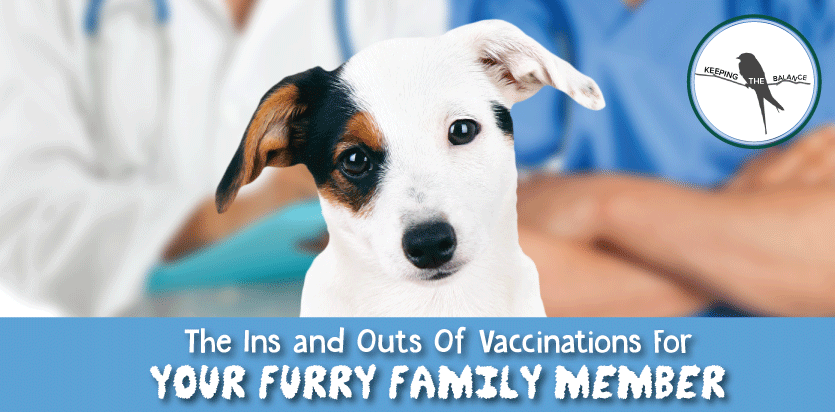Critters & Creatures
Ins and Outs of Vaccinations for your Furry Family Member
 Keeping in mind the old adage “an ounce of prevention is worth a pound of cure,” giving your pets the best defence against all sorts of diseases through proper vaccination is of utmost importance. Knowing the ins and outs of vaccinations might just save the life of your furry family member.
Keeping in mind the old adage “an ounce of prevention is worth a pound of cure,” giving your pets the best defence against all sorts of diseases through proper vaccination is of utmost importance. Knowing the ins and outs of vaccinations might just save the life of your furry family member.
Just like humans, animals can be vaccinated against a variety of dangerous diseases in an effort to protect them. A majority of fully-vaccinated animals will be resistant to the disease they have been vaccinated against.
“Vaccinating is an easy, relatively inexpensive, way to protect against some major disease in your pets,” assures Dr. Nichole Gallant, the immediate past president of the Canadian Veterinary Medical Society (CVMS).
Not getting your pets the proper vaccination could not only be a costly mistake, it could be a heartbreaking one.
It is advised that the best time to vaccinate puppies and kittens is anywhere from six to eight weeks. This is usually the time when animals are being weaned off of their mother’s milk, which typically provides them with the necessary immunity.
“You try to hit the right time to start protecting them with vaccines, once their protection from their mother starts decreasing,” added Gallant, a 34-year veterinary veteran.
Between the time a young animal is off of their mother’s milk and the time they get vaccinated, pets can be very vulnerable. Veterinarians advise that is better to limit their interaction with other animals at this age to avoid picking up diseases. The six- to eight-week age range is usually when puppies and kittens come into clinics with these life-threatening diseases, says Gallant.
Besides the core vaccines, typically administered through injection, Gallant advises that military families make sure they talk to the veterinarians in their area about what diseases are prevalent and will require new vaccinations when moving from base-to-base.
“You want to talk to somebody in the area and see what diseases are present,” added Gallant.
Once puppies and kittens are given their initial set of vaccines and the boosters a year later, pets will require vaccination every three years for the core vaccines, depending on the animal. However, yearly exams are the best method to determining whether your pet needs additional protection or not.
Many pet owners might instead decide to give their pets a titer test to determine whether they require vaccination or can avoid it.
Regardless of which route you may decide to go, Gallant believes that it is always better to be careful rather than risk it.
“Bottom line, again, is just to get the information, what’s in the area, before and know what is treated. It’s always better to prevent than to treat,” said Gallant.
Here are some of the most common vaccinations for cats and dogs:
Cats:
Feline Panleukopenia (Distemper)
This is one of the most vital vaccinations for felines, typically given early on in a kitten’s life. Panleukopenia, which is potentially fatal, causes vomiting, diarrhea, severe dehydration, fever, and can cause permanent brain damage. However, it is easily preventable through vaccinations.
Feline Rhinotracheitis and Calicivirus
Vaccines help to lessen the effect of, if not completely prevent, this disease which infects the airways of cats and causes runny eyes and nose, sneezing, mouth ulcers and more.
Non-core vaccines for cats
Feline Leukemia Virus
Dogs:
Canine Parvovirus
This disease, caused by parvoviruses of types CPV-2, CPV-2a, CPV-2b and CPV-2c, is one of the most common amongst dogs. Similar to the feline Panleukopenia, it presents a multitude of symptoms including vomiting, diarrhea, and death. Vaccinations are recommended by the CVMS as the best strategy to guard against the disease no matter whether a dog is an indoor apartment dog or outdoor dog, a puppy, senior, or anywhere in between.
Canine Distemper
The Canine Distemper virus impacts the respiratory, digestive and nervous system of infected dogs, and those that recover from it may have permanent damage to their nervous system. According to the CVMS, “unvaccinated dogs are at a 350-fold increased risk of contracting this highly contagious disease.”
Infectious Canine Hepatitis
This disease also can have life-threatening consequences for affected dogs.
Heartworm:
Though heartworm can impact cats, it most commonly presents itself in dogs. The disease is caused by a parasite and is transmitted by mosquito bites who transfer blood of heartworm positive dogs to others. The microfilariae transmitted in the mosquito bites grows into a larva which then matures and migrates to the heart. The worm will then begin reproducing.
According to the CMVS, heartworm prevention is case-by-case and depends on the region and pet’s lifestyle. Dogs are typically tested for heartworm in the spring and treatment begins just as mosquito season starts.
Non-core vaccines for dogs
Bordetellosis, Canine Parainfluenza Virus, Leptospirosis, Lyme disease, and Coronavirus.
Diseases common to both cats and dogs:
Rabies
Rabies is one disease that is common to all mammals, including humans. Therefore Rabies prevention is critical for all pets, whether they are indoor or not, hunting animals or not. In parts of Canada, legislation has been created for Rabies vaccination.
Fleas
Although not too harmful, fleas can be considered an annoyance for both animals and pet owners. Flea treatment is generally administered in summer months until the first snowfall.
“It can be important to talk to whatever base people are being transferred to, to know what’s in the area. If they’re going to, let’s say, to the southern U.S., their flea treatment is year-round because there’s no winter,” warns Gallant.
Ticks
Unlike fleas, ticks can be harmful and can carry diseases like Lyme Disease. If you are living in a region where ticks are prevalent, tick prevention is strongly recommended.
Roundworms
Many puppies and kittens are born with roundworms. Though the symptoms aren’t too severe in animals, roundworms can pose a high risk for children. Therefore, it is advisable to deworm your pets when they are young.











